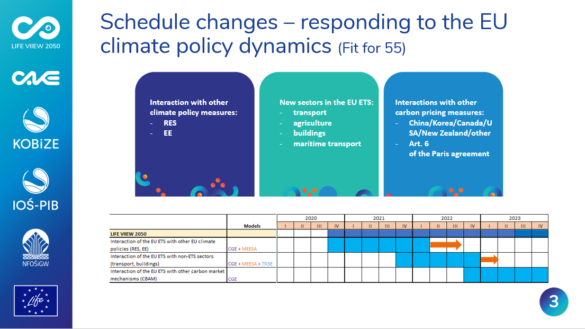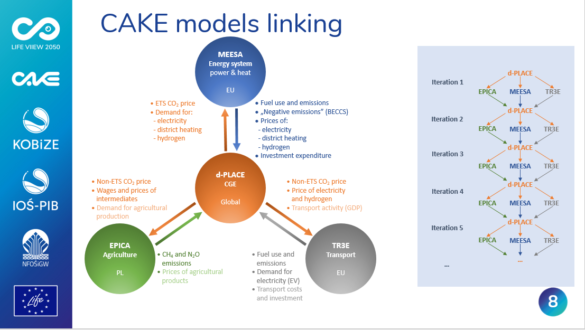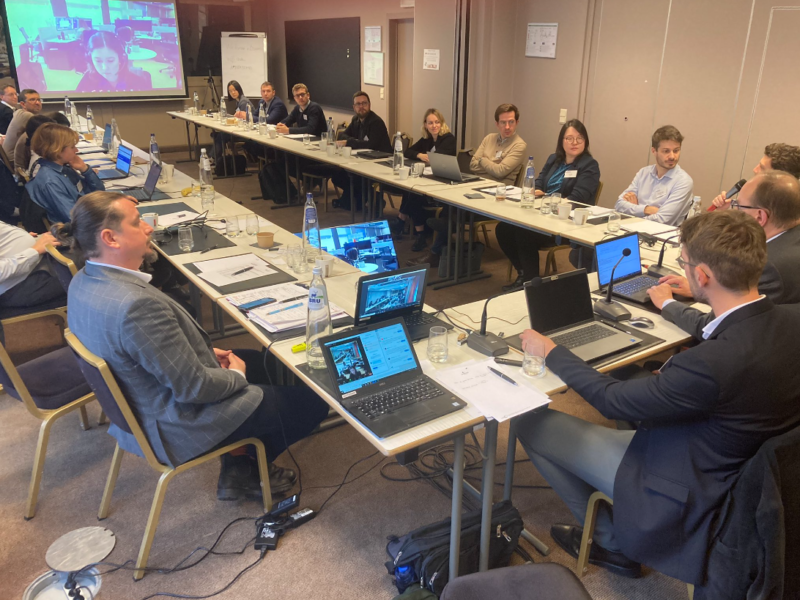
On November 30, our experts, project coordinator – Robert Jeszke and modeling expert – Maciej Pyrka, took part in workshops organized by Potsdam Institute for Climate Impact Research (PIK) and Ecologic Institute entitled “The EU-ETS price through 2030 and beyond: A closer look at drivers, models and assumptions”. The recording of the webinar can be found at this link.
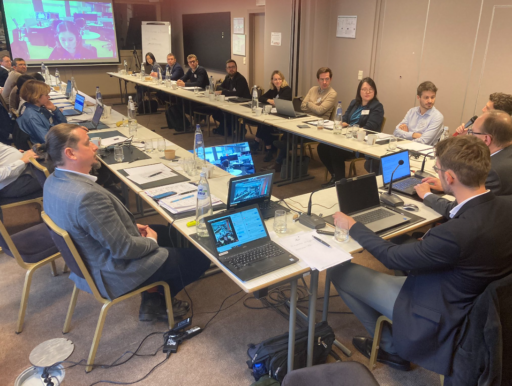 With the Fit-for-55 package about to be put into law, and the RePowerEU plan adopted in response to the energy crisis, EU climate and energy is undergoing the most profound change in years, getting the EU on track to a post-fossil energy system. In a three-day series of events, partners from the Ariadne research project presented key insights from their work that is relevant for the further development of EU climate and energy policy, and discussed these with representatives from political institutions, academia, civil society and business. The events served to share research insights, to discuss and validate findings and their relevance for EU policy process, and to gather inputs for further research. The Ariadne project is a collaborative effort by more than 25 German research institutions that investigates strategies and instruments to advance the energy transition and to achieve climate goals in an efficient and socially balanced way. Ecologic Institute supports the linkage of research with the EU climate and energy discussion.
With the Fit-for-55 package about to be put into law, and the RePowerEU plan adopted in response to the energy crisis, EU climate and energy is undergoing the most profound change in years, getting the EU on track to a post-fossil energy system. In a three-day series of events, partners from the Ariadne research project presented key insights from their work that is relevant for the further development of EU climate and energy policy, and discussed these with representatives from political institutions, academia, civil society and business. The events served to share research insights, to discuss and validate findings and their relevance for EU policy process, and to gather inputs for further research. The Ariadne project is a collaborative effort by more than 25 German research institutions that investigates strategies and instruments to advance the energy transition and to achieve climate goals in an efficient and socially balanced way. Ecologic Institute supports the linkage of research with the EU climate and energy discussion.
In this three-session workshop, participants discussed the types of models, implementation details as well as core assumptions employed in the analysis of ETS prices targeted to inform the policy debate. More specifically, the workshop demonstrated the diversity of approaches, discussed their pros and cons, and identified major sensitivities and arising developments affecting the price of carbon through the end of this decade and beyond. While the first two sessions of the workshop took place as a closed-door discussion between academic modellers, carbon market analysts and invited guests, the third session had the form of a public webinar.
Robert Jeszke said that the main EUA price drivers till 2030 would be:
Please be informed that from December 1, 2022, the correspondence address of the National Centre for Emissions Management has changed.
The new address is:
ul. Krucza 5/11D,
00-548 Warsaw
AdJUST – Advancing the Understanding of Challenges, Policy Options and Measures to Achieve a Just EU Energy Transition
ABOUT THE PROJECT
AdJUST is a transdisciplinary project aimed mainly at achieving a significant change in the social understanding of the distributional consequences of the transition towards climate neutrality and at identifying effective interventions that will minimize the negative impacts of the transition. Accordingly, AdJUST combines the research approaches of various scientific disciplines with continuous social dialogue. AdJUST is funded by the European Union’s Horizon Europe programme and carried out by a transdisciplinary European consortium consisting of 9 EU partners, 2 UK associated partners and other 11 EU associated partners. Project started on 1st October 2022 and will last for 48 months, until 30th September, 2026.
OBJECTIVES
AdJUST activities involve European public bodies, industry, civil society and researchers, working together to design and promote a shared vision towards the common goal of achieving climate neutrality. It relies on state-of-the-art economic assessment tools, statistical analysis, and research approaches from other social science disciplines — including political science, business management, public administration, political theory, philosophy and ethics — to generate methodologically-sound research results on the full range of challenges of the just transition. These comprise technical, economic, and social/equity dimensions for companies, workers, households and public bodies, and the potential distributional impacts of the EU Green Deal, NextGenerationEU and Fit for 55 package. AdJUST thus combines research approaches from complementary disciplines with a continuous social dialogue, ensuring that the project practices open science, models procedural justice, and builds understanding, trust and capacity among citizens and other stakeholders concerning the transition to climate neutrality.
CAKE ENGAGEMENT
As part of the project, the CAKE Team – placed in the IOS-PIB structure – will primarily develop a model tool (d-PLACE model) for assessing the impact of climate policy on the economy. In particular, we are going to implement the specificity of the labour market in the model. The preparation of the tool will enable assessing how the low-emission transformation affects the flow of employees between sectors. The results of the analyses will be presented in the form of scientific reports.
AdJUST project is also an opportunity to cooperate with leading research institutes. The CAKE team will meet regularly with other consortium teams to discuss assumptions and analysis results.
AdJUST – Advancing the Understanding of Challenges, Policy Options and Measures to Achieve a Just EU Energy Transition
ABOUT THE PROJECT
AdJUST is a transdisciplinary project aimed mainly at achieving a significant change in the social understanding of the distributional consequences of the transition towards climate neutrality and at identifying effective interventions that will minimize the negative impacts of the transition. Accordingly, AdJUST combines the research approaches of various scientific disciplines with continuous social dialogue. AdJUST is funded by the European Union’s Horizon Europe programme and carried out by a transdisciplinary European consortium consisting of 9 EU partners, 2 UK associated partners and other 11 EU associated partners. Project started on 1st October 2022 and will last for 48 months, until 30th September, 2026.
OBJECTIVES
AdJUST activities involve European public bodies, industry, civil society and researchers, working together to design and promote a shared vision towards the common goal of achieving climate neutrality. It relies on state-of-the-art economic assessment tools, statistical analysis, and research approaches from other social science disciplines — including political science, business management, public administration, political theory, philosophy and ethics — to generate methodologically-sound research results on the full range of challenges of the just transition. These comprise technical, economic, and social/equity dimensions for companies, workers, households and public bodies, and the potential distributional impacts of the EU Green Deal, NextGenerationEU and Fit for 55 package. AdJUST thus combines research approaches from complementary disciplines with a continuous social dialogue, ensuring that the project practices open science, models procedural justice, and builds understanding, trust and capacity among citizens and other stakeholders concerning the transition to climate neutrality.
CAKE ENGAGEMENT
As part of the project, the CAKE Team – placed in the IOS-PIB structure – will primarily develop a model tool (d-PLACE model) for assessing the impact of climate policy on the economy. In particular, we are going to implement the specificity of the labour market in the model. The preparation of the tool will enable assessing how the low-emission transformation affects the flow of employees between sectors. The results of the analyses will be presented in the form of scientific reports.
AdJUST project is also an opportunity to cooperate with leading research institutes. The CAKE team will meet regularly with other consortium teams to discuss assumptions and analysis results.

On the 20th October 2022, the second meeting of the Advisory Group took place. The meeting was held online. The meeting was attended by representatives of the Advisory Group and representatives of the LIFE VIIEW 2050 project.
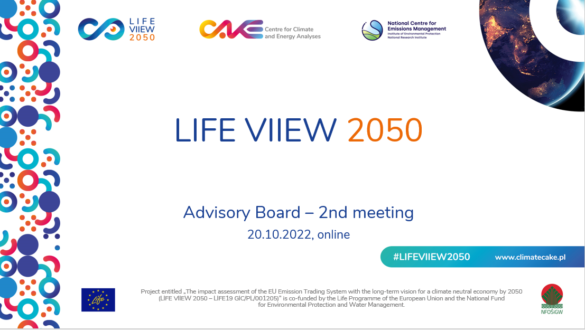
The meeting was chaired by Robert Jeszke, LIFE VIIEW Project Coordinator. Robert Jeszke presented information on the project’s implementation plan, the analyses being prepared, and about the platform of modeling experts, which will be a place to share experiences for the LIFE VIIEW 2050 project. The main goal of the analysis being prepared is to develop scenarios to support policies and measures which would lead to decarbonization in 2050, with the inclusion of EU ETS and non-ETS sectors.
The second LIFE VIIEW 2050 Advisory Board meeting was attended by:
At the main part of the meeting Jakub Boratyński, CGE modelling expert for the LIFE VIIEW 2050 project, gave a presentation on the main modelling ongoing work, including the models used and how they are combined, and the analytical assumptions used in the model scenarios. The meeting was a good opportunity to exchange knowledge, views and perspectives on modeling scenarios, assumptions, information and data.
After the presenatation the substantive discussion with regard to the adopted modelling principles was held which focused mainly:
More information about the LIFE VIIEW 2050 project you can find here: https://climatecake.ios.edu.pl/life-viiew-2050-project/?lang=en
